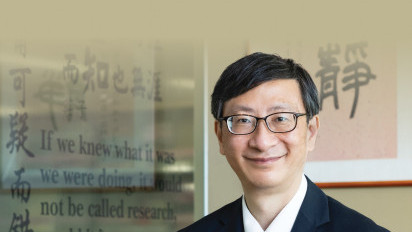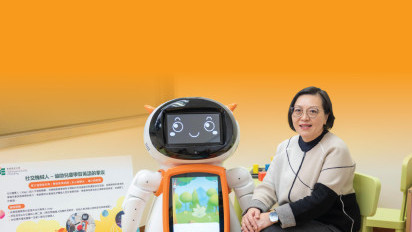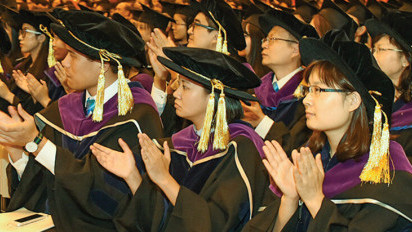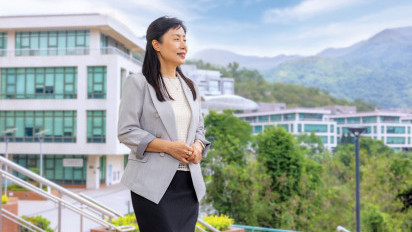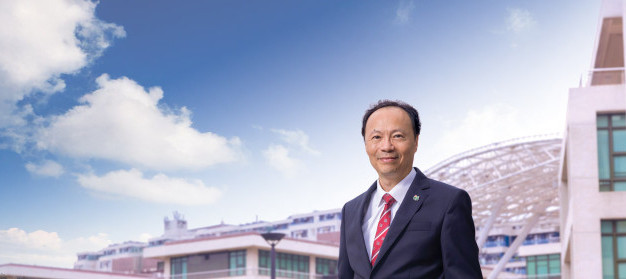After a decade away, Dr Tom Fong Wing-ho, returned to The Education University of Hong Kong last September, taking on the role of Vice President (Administration). He oversees the management of the University’s administrative functions and upholds the philosophy of ‘collaborative effort and collective wisdom’, working closely with the Council, staff, students, alumni, and stakeholders from various sectors to jointly promote the continuous development of EdUHK.
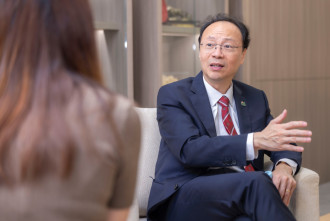
Having worked in the civil service as well as public and commercial organisations, Dr Fong ventured into higher education some 25 years ago, serving as the Head of the Career Planning and Development Centre at The Chinese University of Hong Kong. He joined The Hong Kong Institute of Education (EdUHK’s predecessor) in 2008, and later moved to Hang Seng Management College (renamed The Hang Seng University of Hong Kong in 2018) in 2014. Reflecting on his years in higher education, his most unforgettable experience with students was during his tenure as Director of Student Affairs at the Institute in 2009. Drawing on his experience as a debater during his undergraduate years and his past guidance of debate teams, he provided coaching and training to the Institute’s team in preparation for the Inter-Collegiate Debate Competition during his spare time. Together with the support and assistance of other instructors and alumni, the debate team performed outstandingly, exceeded expectations and ultimately won the then Institute’s first-ever championship in the Inter-Collegiate Debate Competition. Dr Fong was deeply moved when he heard about the championship win from the debate team captain, a moment that remains vivid in his memory. “During those months of interaction, witnessing the team members encouraging each other and continuously learning, their rapid growth was truly gratifying,” he remembers.
Expanding new campuses
Returning to the familiar yet unfamiliar EdUHK, seeing the lush greenery of the campus and the energetic students, a sense of nostalgia naturally emerged. At the same time, he is pleased to see the University’s capabilities have significantly grown, with teaching and research advancing in tandem, the variety of courses continuously being enriched, the number of courses increasing, and the rapid rise in faculty and student numbers. As a consequence, campus space has become increasingly constrained, making the expansion of spatial resources and the search for new teaching centres a top priority.
Under Dr Fong’s stewardship, the University’s new study centre at the Xiqu Centre in the West Kowloon Cultural District will become operational during the 2025-26 academic year. Additionally, the new academic building on the Tai Po campus — after the topping out ceremony held earlier this year — will be completed by the end of 2025. Dr Fong’s next focus is exploring the feasibility of establishing new campuses in the Northern Metropolis and working out the procedures and details for opening teaching and research centres across the Greater Bay Area. “We are poised to step out of Hong Kong, collaborate with more mainland and overseas institutions, and attract a greater number of students from all over the world to enrol in our programmes,” he says.
We are poised to step out of Hong Kong, collaborate with more mainland and overseas institutions, and attract a greater number of students from all over the world to enrol in our programmes.
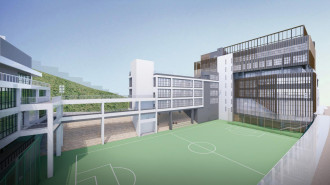
Creating a green campus
To fulfil social responsibilities, EdUHK actively supports the UN Sustainable Development Goals (SDGs) by promoting sustainable development and creating a green campus, which is a key focus of the University’s Strategic Plan 2025-2031. Specific measures include installing wind-powered street lamps and electric vehicle charging facilities, using recycled water for plant irrigation, laying solar panels, adding recycling points for waste classification in various campus corners, and organising more green initiatives to enhance environmental awareness among faculty and students. The ultimate goal is to reduce carbon emissions and lower electricity consumption, contributing to a more sustainable future.
From the University’s strategic development to flora and fauna, these are his areas of concern. “The campus is home to dozens of species of birds, insects and fish, as well as a variety of plants and flowers,” he explains. “Walking along the Heritage Walk every morning, you can feel the breeze and the fragrance of flowers.” He has recently been working with the Estates Office to explore planting uniform trees and flowers along the driveway between the Student Halls and teaching buildings, for a neat and aesthetically pleasing effect. “In the future, the University will further enhance its ESG (Environmental, Social, and Governance) indicators, making the Tai Po campus a model for sustainable development in Hong Kong’s higher education sector.”
Connecting with the world
%20and%20Dr%20Fong%20(left)%20demonstrate%20their%20skills%20with%20a%20special%20table%20tennis%20racket_%20Ping%20Pong-Galleary-6_1751534051.jpg)
From frontline student affairs to strategic development and administrative work, Dr Fong’s career has also undergone transformation and development, with the scope of his involvement becoming increasingly broad, including human resources, finance, information technology, campus development and management, and Council Secretariat. Looking back, he believes that his university education laid a solid foundation for his career, particularly in terms of training in critical thinking and logical analysis, enabling him to confidently face constant opportunities and challenges. With the rapid development of technology and increasingly close global connections, Dr Fong considers that the higher education sector must keep pace with the times, cultivating future talents with interdisciplinary knowledge and international perspectives. As a leader in local teacher education, EdUHK will continuously deepen academic exchanges and research collaborations with institutions at home and further afield. Through curriculum reform, combining social development and trends, such as values education and artificial intelligence applications, it will help students equip themselves with the skills to face future challenges.
“We plan to introduce more innovative programmes integrating technology and other disciplines in the next six years, while collaborating with an expanded network of domestic and international institutions to even better align with international systems,” Dr Fong says. “These initiatives will enable our students to stand out in global competition and become a key force driving social progress,” he adds.
Other Interview Articles


